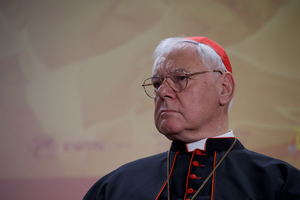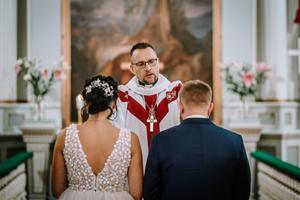Vatican Prosecutions of Journalists Generate Criticism, Questions
Several prominent organizations have objected to the indictment of two Italian journalists, while others wonder why other leaks haven’t prompted a similar response.

VATICAN CITY — The world’s largest intergovernmental security organization, Italian media associations and members of the Italian legal profession have criticized a Vatican court for indicting two Italian journalists for publishing leaked confidential Vatican documents.
The Vatican is standing firm by its decision, and its lawyers insist it is not trampling on rights to freedom of speech.
But questions are being raised about consistency in the Vatican’s approach, as some other recent breaches in confidentiality among those in senior positions appear to have taken place in recent years with impunity.
Last Monday, the Organization for Security and Cooperation in Europe called on the Vatican to withdraw criminal charges against two journalists, Emiliano Fittipaldi and Gianluigi Nuzzi, after they published the confidential information in two new books. “Journalists must be free to report on issues of public interest and to protect their confidential sources,” said Dunja Mijatovic, said the OSCE’s media freedom representative.
The Vienna-based organization, whose 57 member states include the Holy See, was formed during the Cold War to monitor conflicts, election observation and media rights.
Further criticism of the indictments came from the International Association of Journalists Accredited to the Vatican, which said it was worried that the two journalists were being prosecuted. “We do not speak of the merit of the specific accusations. But we [must emphasize] that publishing news is exactly their work,” the association said. “And it seems to us that the decision to try our two colleagues is not acceptable.”
Reporters Without Borders, the Italian journalists’ federation and Italy’s foreign press association have also condemned the indictments. The widespread criticism has placed the Vatican in an embarrassing position that could be difficult to correct and has led to criticisms that it is acting more like a state than a church.
Preliminary Hearing
Nuzzi and Fittipaldi faced preliminary hearings in a Vatican state court Nov. 24, along with three former Vatican officials accused of leaking the confidential documents: Spanish Msgr. Lucio Angel Vallejo Baldo, Italian PR specialist Francesca Immacolata Chaouqui and Nicola Maio, Msgr. Vallejo’s assistant. The three had been working in a now-defunct special commission set up by Pope Francis to advise him on economic reform within the Vatican.
The trial was adjourned Nov. 30 until next week, after Chaouqui was granted five days to study the prosecution case against her and possibly introduce new evidence after replacing her court-appointed lawyer with her own defense counsel.
The Vatican said the two journalists are accused of publishing the confidential documents and of “soliciting and exercising pressure, above all on Vallejo Balda, to obtain the documents and other reserved information.”
Their books document a mix of greed, waste and mismanagement at the Vatican as well as resistance to Pope Francis’ reforms. Although much of the information is true, the Vatican has said it has to be read in context and that many of the problems have been, or are being, addressed. Cardinal George Pell, prefect of the Secretariat for the Economy, has denied the allegations made against him as “false and misleading.”
Fittipaldi’s lawyer mounted an objection at the trial, protesting the charges and underlining his freedom as a journalist to publish news and asking that the indictment against his client be annulled because it failed to give a precise declaration of the alleged offenses made against him.
After considering the objection for 45 minutes, along with another objection from Msgr. Vallejo’s attorney calling for more time to mount a defense, the court rejected them both.
Responding to Fittipaldi’s objection, the Vatican’s adjunct promoter of justice, Roberto Zannotti, said the Vatican was not intending to trample on the freedom of the press, but that the defendant should be held accountable for how he obtained the published documents and other information, and this was stated in his indictment.
Journalist Nuzzi: ‘Kafkaesque’
In a media conference following the hearing, Nuzzi described the process as “Kafkaesque” and claimed he hadn’t revealed any secrets that damaged the security of the Church or any information that was false.
Lorenzo Fazio, his publisher’s managing editor, has said the documentation for Nuzzi’s book Merchants of the Temple “was not stolen, was not an object of theft; it was freely given.” The people who provided the documents had “ownership” and “lawful access,” he said.
Writing in La Repubblica Nov. 25, Fittipaldi spoke of his “disbelief” at being charged before courts “other than those of my country.” He said that in Italy he would “not be criminally prosecuted for the charges” made against him because the accusations would not be deemed “false or defamatory.” He said he had simply “published news — a right guaranteed by the Italian Constitution” and the Universal Declaration of Human Rights.
In comments to the Register Nov. 25, prominent Italian lawyer Ugo Ruffolo said he did not know the details of this particular case, but that, according to Italian law, every journalist has the right to report news. What is against the law is obtaining it by illicit means.
“If you have something in your pocket, I cannot put my hand in your pocket and remove the object; but if someone else one wants to take it and give the stolen object to a newspaper, then they can talk about that,” he said. “This is very important because if the journalist carried out the action of a hacker, then that is illegal. But if I am hacker and I pick up news illegally, and send it as news to a journalist, then he can legally talk about it.”
Jurist Francesco Margiotta Broglio, who helped amend the Lateran Treaty with the Holy See in 1984, told La Stampa Nov. 27 the Vatican has, like the United States or India, every right to summon Italian citizens to trial for crimes committed in its own territory. But he said “emerging tensions” revolve around whether the alleged offense was committed in Italian or Vatican territory. “It’s the element that changes everything,” he said.
Legacy of Vatileaks Scandal
The Vatican’s perceived hard line stems from a tightening of its laws on leaking confidential information after the Vatileaks scandal of 2012, in which Pope Benedict XVI’s butler, Paolo Gabriele, was found guilty of stealing sensitive documents from the papal household. Nuzzi published the contents of some of the stolen documents in a book he published that year.
That incident led to Pope Francis introducing new Vatican legislation, Law IX, Art. 10 and Art. 116, on July 13, 2013.
Under the title “Disclosure of Information or Documents,” the law states that whoever “illicitly obtains or reveals information or documents whose disclosure is forbidden is punished with six months to two years imprisonment or with a fine ranging from 1,000 to 5,000 euro.”
The law states that a sentence of four-six years imprisonment is possible if the offense involves the disclosure of information or documents concerning the “fundamental interests or the diplomatic relations” of the Holy See. If the offense is due to “criminal negligence,” then the sentence can be anything from six months to two years.
Lawyers see weaknesses in the statute, as it is not clear what the revealed “information” exactly means, nor what is meant by “forbidden.”
“Usually people are put on trial if there’s strong evidence of a crime,” said Ruffolo. “It’s not a good thing to be so strong against rights to freedom of speech; it’s a problem of opportunity [fair trial].”
No Investigation of Cardinals’ Letter?
The controversy over trying the two journalists comes just weeks after the publication of a confidential and private letter sent to Pope Francis by 13 cardinals during the synod — another breach in confidentiality, but one the Vatican appears yet to have investigated.
News of the letter, which voiced concerns about the synod’s organization, was first reported Oct. 8 by Andrea Tornielli of Vatican Insider. The publication has a friendly relationship with Pope Francis; Tornielli sees the Pope fairly frequently and is to publish a book interview with the Holy Father early next year.
Tornielli wrote that “having received it, Francis addressed synod fathers, urging them to steer clear of a ‘hermeneutics of conspiracy.’” The editor in chief of the Italian Jesuit periodical La Civiltà Cattolica, Father Antonio Spadaro, was the first to report on the Pope’s use of the term “hermeneutic of conspiracy,” tweeting it from his Twitter account. Tornielli then disclosed the existence of the letter soon afterwards. Another Italian Vaticanist, Sandro Magister, subsequently published a draft of the letter Oct. 13, nearly a week after Tornielli had first disclosed it.
Cardinal Pell, one of the signers of the letter, said at the time he was “quite sure” that “none of the 13 signatories leaked it.” It was “in their interests for the document to remain confidential,” he said. He has since confirmed to the Register that the letter was classified as “confidential.”
Some at the Vatican argue that making public a private and confidential letter to the Pope is not the same as leaking a confidential document relating to Vatican finances. But even if the legal implications may not be the same, others counter, the moral implications of leaking it remain.
Cardinal Pell’s office told the Register Nov. 27 that “certainly leaks like this should be investigated with the same rigor as other leaks.”
Other information relating to appointment of bishops, usually treated as top secret by the Vatican, is also frequently leaked and reported. Cardinals, too, have breached confidentiality rules regarding conclaves in recent years without receiving reprimands.
The Register has asked both Vatican spokesman Father Federico Lombardi and Andrea Tornielli to give details of any possible investigation into the leaking and publication of the letter of the 13 cardinals, but neither party has responded to the inquiries.
Pope Francis’ Comments
Pope Francis indirectly addressed the prosecution of the two Italian journalists, in response to a question posed by a journalist on board the papal flight returning from the Pope’s Nov. 25-30 trip to Africa.
“In Uganda you spoke off the cuff, and you said corruption exists everywhere, and also in the Vatican. My question is this: What is the importance of the press, the free, secular press, in rooting out corruption wherever it is found?” the journalist asked.
“The free press, secular and also religious, but professional; because the press, secular or religious, must be professional,” the Holy Father said. “It’s important that they are truly professional, that the news isn’t manipulated. For me, it’s important, because the denunciation of corruption, of injustice, is good work, because there is corruption.”
Continued the Pope, “And then the one in charge must do something, make a judgment, a tribunal. The professional press must tell everything, without falling into the three most common sins: misinformation, to tell one half but not the other; calumny, which is not professional — when there is no professionality, you dirty the other person, with or without truth; and defamation, to take away the good name of the person who right now hasn’t done anything wrong to anyone; maybe it’s something from the past. These are the three defects that are an attack against the professionality of the press. We need professionality, what’s right: things are like this and this.
“And on corruption? To see the data well and say it: this, this and this. If there is corruption, they should say it. And if a journalist, if he is truly professional, gets it wrong, he should excuse himself. Things go very well like this.”
Edward Pentin is the Register’s Rome correspondent.
- Keywords:
- edward pentin
- pope francis
- vatican
- vatican journalism


















